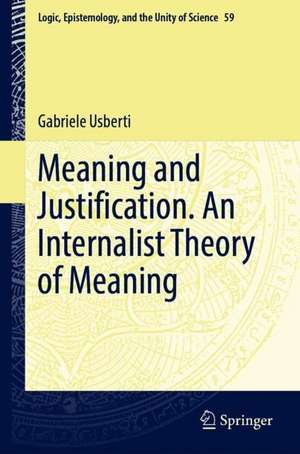Meaning and Justification. An Internalist Theory of Meaning: Logic, Epistemology, and the Unity of Science, cartea 59
Autor Gabriele Usbertien Limba Engleză Hardback – 29 iul 2023
In the second part the theory is applied to the solution of several foundational problems in the theory of meaning and epistemology, such as Frege’s puzzle, Mates’ puzzle about synonymy, the paradox of analysis, Kripke’s puzzle about belief, the de re/de dicto distinction, the specific/non-specific distinction, Gettier’s problems, the paradox of knowability, and the characterization oftruth. On a more general philosophical level, throughout the book the author develops a tight critique of the neo-verificationism of Dummett, Prawitz and Martin-Löf, and defends a mentalist interpretation of intuitionism.
Din seria Logic, Epistemology, and the Unity of Science
- 15%
 Preț: 645.60 lei
Preț: 645.60 lei - 18%
 Preț: 1233.06 lei
Preț: 1233.06 lei - 18%
 Preț: 995.94 lei
Preț: 995.94 lei - 18%
 Preț: 1712.87 lei
Preț: 1712.87 lei - 18%
 Preț: 945.62 lei
Preț: 945.62 lei - 18%
 Preț: 1235.25 lei
Preț: 1235.25 lei - 18%
 Preț: 1224.06 lei
Preț: 1224.06 lei - 18%
 Preț: 955.70 lei
Preț: 955.70 lei - 15%
 Preț: 644.95 lei
Preț: 644.95 lei - 24%
 Preț: 1058.23 lei
Preț: 1058.23 lei - 20%
 Preț: 558.63 lei
Preț: 558.63 lei - 24%
 Preț: 878.92 lei
Preț: 878.92 lei - 18%
 Preț: 1236.99 lei
Preț: 1236.99 lei - 24%
 Preț: 896.30 lei
Preț: 896.30 lei - 24%
 Preț: 791.27 lei
Preț: 791.27 lei - 24%
 Preț: 727.49 lei
Preț: 727.49 lei - 24%
 Preț: 789.90 lei
Preț: 789.90 lei - 20%
 Preț: 561.68 lei
Preț: 561.68 lei - 20%
 Preț: 560.31 lei
Preț: 560.31 lei - 20%
 Preț: 568.74 lei
Preț: 568.74 lei - 24%
 Preț: 1046.22 lei
Preț: 1046.22 lei - 24%
 Preț: 698.18 lei
Preț: 698.18 lei - 20%
 Preț: 549.89 lei
Preț: 549.89 lei - 18%
 Preț: 958.73 lei
Preț: 958.73 lei - 20%
 Preț: 580.53 lei
Preț: 580.53 lei - 20%
 Preț: 561.44 lei
Preț: 561.44 lei
Preț: 792.96 lei
Preț vechi: 967.03 lei
-18% Nou
Puncte Express: 1189
Preț estimativ în valută:
151.74€ • 162.26$ • 126.51£
151.74€ • 162.26$ • 126.51£
Carte tipărită la comandă
Livrare economică 18 aprilie-02 mai
Preluare comenzi: 021 569.72.76
Specificații
ISBN-13: 9783031246043
ISBN-10: 3031246047
Ilustrații: XXIII, 390 p. 20 illus.
Dimensiuni: 155 x 235 mm
Greutate: 0.76 kg
Ediția:1st ed. 2023
Editura: Springer International Publishing
Colecția Springer
Seria Logic, Epistemology, and the Unity of Science
Locul publicării:Cham, Switzerland
ISBN-10: 3031246047
Ilustrații: XXIII, 390 p. 20 illus.
Dimensiuni: 155 x 235 mm
Greutate: 0.76 kg
Ediția:1st ed. 2023
Editura: Springer International Publishing
Colecția Springer
Seria Logic, Epistemology, and the Unity of Science
Locul publicării:Cham, Switzerland
Cuprins
Introduction.- Chapter 1. Motivations for an internalist semantics.- Chapter 2. Varieties of semantical anti-realism.- Chapter 3. Epistemic justifications as cognitive states.- Chapter 4. C-justifications for atomic sentences. Names and predicates, C-objects and C-concepts.- Chapter 5. C-justifications for logically complex sentences.- Chapter 6. C-truth-grounds.- Chapter 7. Internal truth and truth-recognition.- Chapter 8. Validity, assertion, inference, and transparency.- Chapter 9. Belief, synonymy, and the de dicto/de re distinction.- Chapter 10. Knowledge and Gettier problems.- Chapter 11. The paradox of knowability.- Chapter 12. Is there an anti-internalist argument in the Philosophical Investigations?
Notă biografică
Gabriele Usberti has been professor of philosophy of language at the Universities of Milano and Siena (Italy). He has written on the foundations of linguistics, on the semantic paradoxes and on the neo-verificationist theories of meaning. Actually he works on internalist semantics and philosophical aspects of intuitionistic logic.
Textul de pe ultima copertă
This volume develops a theory of meaning and a semantics for both mathematical and empirical sentences inspired to Chomsky’s internalism, namely to a view of semantics as the study of the relations of language not with external reality but with internal, or mental, reality. In the first part a theoretical notion of justification for a sentence A is defined, by induction on the complexity of A; intuitively, justifications are conceived as cognitive states of a particular kind. The main source of inspiration for this part is Heyting’s explanation of the intuitionistic meaning of logical constants.
In the second part the theory is applied to the solution of several foundational problems in the theory of meaning and epistemology, such as Frege’s puzzle, Mates’ puzzle about synonymy, the paradox of analysis, Kripke’s puzzle about belief, the de re/de dicto distinction, the specific/non-specific distinction, Gettier’s problems, the paradox of knowability, and the characterization oftruth. On a more general philosophical level, throughout the book the author develops a tight critique of the neo-verificationism of Dummett, Prawitz and Martin-Löf, and defends a mentalist interpretation of intuitionism.
In the second part the theory is applied to the solution of several foundational problems in the theory of meaning and epistemology, such as Frege’s puzzle, Mates’ puzzle about synonymy, the paradox of analysis, Kripke’s puzzle about belief, the de re/de dicto distinction, the specific/non-specific distinction, Gettier’s problems, the paradox of knowability, and the characterization oftruth. On a more general philosophical level, throughout the book the author develops a tight critique of the neo-verificationism of Dummett, Prawitz and Martin-Löf, and defends a mentalist interpretation of intuitionism.
Caracteristici
Offers a change of paradigm in semantic analysis Presents new argument for intuitionistic logic Proposes a revolutionary approach to propositional attitudes
